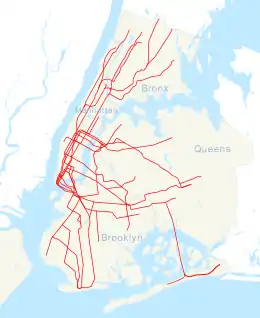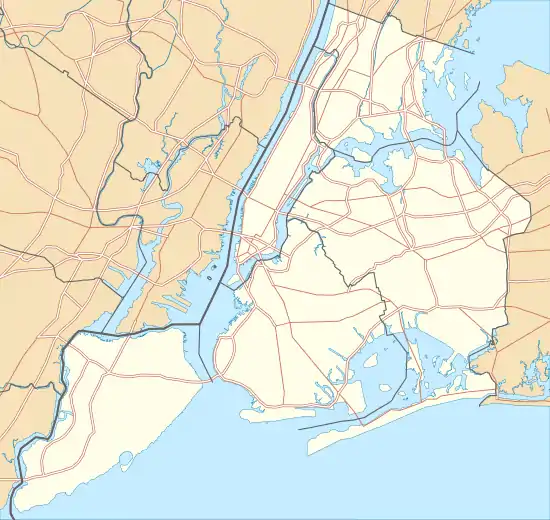18th Avenue station (BMT West End Line)
The 18th Avenue station is a local station on BMT West End Line of the New York City Subway in Bensonhurst, Brooklyn. It is served by the D train at all times. The station opened in 1916 as part of the BMT West End Line, which was upgraded into an elevated line as part of the Dual Contracts. Its platforms were extended to accommodate ten-car trains in the 1960s, and the station was renovated in 2012. The station is scheduled to become compliant with the Americans with Disabilities Act of 1990 through the installation of elevators.
18 Avenue | ||||||||||||||||||||||||||||||||||||||||||||||||||||||||||||||||||||
|---|---|---|---|---|---|---|---|---|---|---|---|---|---|---|---|---|---|---|---|---|---|---|---|---|---|---|---|---|---|---|---|---|---|---|---|---|---|---|---|---|---|---|---|---|---|---|---|---|---|---|---|---|---|---|---|---|---|---|---|---|---|---|---|---|---|---|---|---|
 View of northbound platform | ||||||||||||||||||||||||||||||||||||||||||||||||||||||||||||||||||||
| Station statistics | ||||||||||||||||||||||||||||||||||||||||||||||||||||||||||||||||||||
| Address | 18th Avenue & New Utrecht Avenue Brooklyn, NY 11214 | |||||||||||||||||||||||||||||||||||||||||||||||||||||||||||||||||||
| Borough | Brooklyn | |||||||||||||||||||||||||||||||||||||||||||||||||||||||||||||||||||
| Locale | Bensonhurst | |||||||||||||||||||||||||||||||||||||||||||||||||||||||||||||||||||
| Coordinates | 40.608667°N 74.002115°W | |||||||||||||||||||||||||||||||||||||||||||||||||||||||||||||||||||
| Division | B (BMT)[1] | |||||||||||||||||||||||||||||||||||||||||||||||||||||||||||||||||||
| Line | BMT West End Line | |||||||||||||||||||||||||||||||||||||||||||||||||||||||||||||||||||
| Services | D | |||||||||||||||||||||||||||||||||||||||||||||||||||||||||||||||||||
| Transit | ||||||||||||||||||||||||||||||||||||||||||||||||||||||||||||||||||||
| Structure | Elevated | |||||||||||||||||||||||||||||||||||||||||||||||||||||||||||||||||||
| Platforms | 2 side platforms | |||||||||||||||||||||||||||||||||||||||||||||||||||||||||||||||||||
| Tracks | 3 (2 in regular service) | |||||||||||||||||||||||||||||||||||||||||||||||||||||||||||||||||||
| Other information | ||||||||||||||||||||||||||||||||||||||||||||||||||||||||||||||||||||
| Opened | June 24, 1916 | |||||||||||||||||||||||||||||||||||||||||||||||||||||||||||||||||||
| Accessible | not ADA-accessible; accessibility planned | |||||||||||||||||||||||||||||||||||||||||||||||||||||||||||||||||||
| Opposite- direction transfer | Yes | |||||||||||||||||||||||||||||||||||||||||||||||||||||||||||||||||||
| Traffic | ||||||||||||||||||||||||||||||||||||||||||||||||||||||||||||||||||||
| 2019 | 1,942,617[2] | |||||||||||||||||||||||||||||||||||||||||||||||||||||||||||||||||||
| Rank | 244 out of 424[2] | |||||||||||||||||||||||||||||||||||||||||||||||||||||||||||||||||||
| ||||||||||||||||||||||||||||||||||||||||||||||||||||||||||||||||||||
| ||||||||||||||||||||||||||||||||||||||||||||||||||||||||||||||||||||
| ||||||||||||||||||||||||||||||||||||||||||||||||||||||||||||||||||||
| ||||||||||||||||||||||||||||||||||||||||||||||||||||||||||||||||||||
| ||||||||||||||||||||||||||||||||||||||||||||||||||||||||||||||||||||
History

Construction and opening
The 18th Avenue station opened on June 24, 1916, as the terminal of the first portion of the BMT West End Line, which extended from 36th Street on the BMT Fourth Avenue Line.[3][4] The line was originally a surface excursion railway to Coney Island, called the Brooklyn, Bath and Coney Island Railroad, which was established in 1862, but did not reach Coney Island until 1864.[5] Under the Dual Contracts of 1913, an elevated line was built over New Utrecht Avenue, 86th Street and Stillwell Avenue. The section of the West End Line between 62nd Street and this station originally opened with only one track in service. The second track between 62nd Street and 18th Avenue opened on July 8, 1916.[6]
Renovations
The platforms were extended in the 1960s to accommodate the current standard B Division train length of 615 feet (187 m).
In 2012, the station was rehabilitated with funding from the American Recovery and Reinvestment Act of 2009.[7]
In 2019, the Metropolitan Transportation Authority announced that this station would become compliant with the Americans with Disabilities Act of 1990 through the installation of elevators as part of the agency's 2020–2024 Capital Program.[8]
Station layout
| Platform level | Side platform | |
| Northbound local | ← | |
| Peak-direction express | No regular service | |
| Southbound local | | |
| Side platform | ||
| Mezzanine | Fare control, station agent, MetroCard machines | |
| Ground | Street level | Entrance/exit |
_Stair.JPG.webp)
This elevated station has three tracks and two side platforms. The center express track is not normally used. The station is situated in between two curves and the platforms have been extended to the north on both sides.[9]
The 2012 artwork here is called Bensonhurst Gardens by Francesco Simeti. It features laminated glass windows on the platform windscreens, depicting imaginary flowery landscapes.[10]
In popular culture
Some exterior scenes of the 1991 Steven Seagal film Out for Justice were shot outside this station.
References
- "Glossary". Second Avenue Subway Supplemental Draft Environmental Impact Statement (SDEIS) (PDF). Vol. 1. Metropolitan Transportation Authority. March 4, 2003. pp. 1–2. Archived from the original (PDF) on February 26, 2021. Retrieved January 1, 2021.
- "Facts and Figures: Annual Subway Ridership 2014–2019". Metropolitan Transportation Authority. 2020. Retrieved May 26, 2020.
- "Parade, Pageant Mark Celebration". The Brooklyn Daily Eagle. June 24, 1916. p. 8. Retrieved September 16, 2015.
- "Realty Boom Is Predicted for Borough Park Section". The Brooklyn Daily Eagle. June 24, 1916. p. 8. Retrieved September 16, 2015.
- "Opening of the Brooklyn, Bath and Coney Island Railroad". The New York Times. June 9, 1864. p. 2. Retrieved July 28, 2020.
- Report of the Public Service Commission For The First District of the State of New York For The Year Ending December 31, 1916 Vol. 1. New York State Public Service Commission. 1917. p. 48.
- Nunez, Jenifer (August 3, 2012). "MTA completes seven station rehabilitation projects along D Line". Railway Track & Structures. Archived from the original on July 28, 2020. Retrieved August 6, 2012.
- "MTA Announces 20 Additional Subway Stations to Receive Accessibility Improvements Under Proposed 2020-2024 Capital Plan". Metropolitan Transportation Authority (Press release). New York City. December 19, 2019. Archived from the original on April 21, 2020. Retrieved December 24, 2019.
- Dougherty, Peter (2006) [2002]. Tracks of the New York City Subway 2006 (3rd ed.). Dougherty. OCLC 49777633 – via Google Books.
- "18th Avenue - Francesco Simeti - Bensonhurst Gardens, 2012". mta.info. Metropolitan Transportation Authority. Archived from the original on August 7, 2020. Retrieved August 7, 2020.
- "18th Avenue Neighborhood Map". mta.info. Metropolitan Transportation Authority. April 2018. Retrieved December 8, 2020.
External links
- nycsubway.org – BMT West End Line: 18th Avenue
- Station Reporter — D Train
- 18th Avenue entrance from Google Maps Street View
- Platforms from Google Maps Street View


